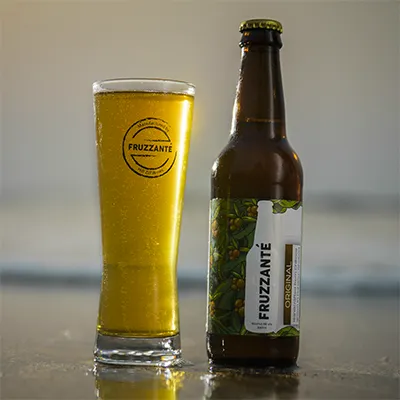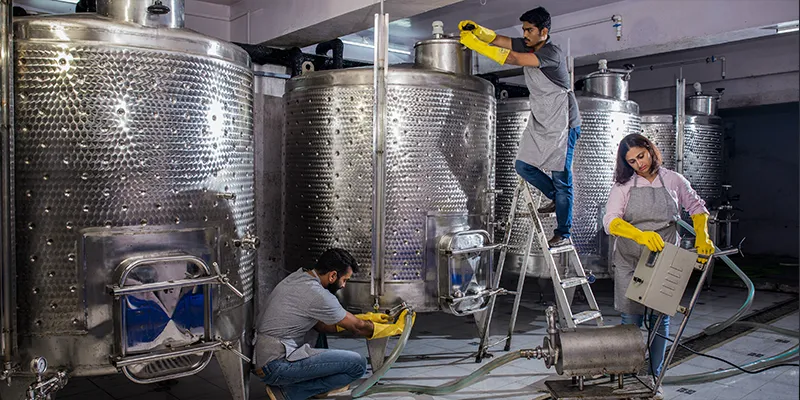Ditching their corporate jobs, this entrepreneur couple is making the world’s first chikoo-based alcoholic beverages
Going beyond the equally-delicious grape wine, these young entrepreneurs give a taste of cider-style alcoholic beverages made from chikoo by marrying traditional farming practices with modernised fermentation and bottling techniques.
For thousands of years, wine has been produced from fermented grapes. In fact, its name can be traced back to the Latin term for ‘grape vine’. In India, wine has been popular for a long time and consumption is steadily on the rise. According to a Research and Markets report, the wine market is growing with a CAGR of more than 25 percent in the last five years.
At present, Indian consumers are moving beyond red wine and are exploring other types, such as white and sparkling wine, as well as cider-style alcoholic beverages (alco-bev). Going a step further, entrepreneur couple Priyanka Save and Nagesh Pai are set to offer consumers a whole new experience with their brand ‘Fruzzante’, the world’s first and only producer of cider-style alco-bev made from chikoo (sapodilla).
“Way back in 2010, the idea was to process chikoo into a packageable form. But we realised that the nature of chikoo was to ferment, and so, we opted to go ahead with a cider-style beverage,” says 33-year-old Priyanka. “After many trials, we were able to officially launch the first batch of cider-style chikoo alco-bev just as 2018 began.”
In just a year, the brand has produced over 25,000 bottles, clocked a turnover of Rs 42 lakh, and is on track to reach Rs 75 lakh this year. Presently, the Fruzzante winery is set up in Bordi, 25 km from Dahanu, Maharashtra, and is part of the family’s Hill Zill Resort. Since the launch, the company has bottled more than fifteen 15,000 liters, and released variants such as a gluten-free beverage range, sparkling white wines, honey dessert wines, and more.
How it began
Priyanka and Nagesh both hold Master’s degrees in Mechanical Engineering, and for a combined ten years, they worked corporate jobs in the field. However, a revolution in the fruit processing industry set them on track to a journey in entrepreneurship. “In the processing industry, chikoo was falling short of packaged products. Small vendors were avoiding the fruit due to its high perishability. But I was a farmer’s daughter, and I knew fruits like the back of my hand. With my wine enthusiast husband, I decided to overturn the depleted chikoo market,” Priyanka explains.
The couple’s connection with farm-grown fruits goes back to their childhood, when they were raised in the chikoo orchards of Dahanu-Gholvad. “The seeds to create something out of these farm-grown products were sown right at a young age,” Priyanka recalls. “In 2004, when the chikoo market was affected by a seed borer disease and farmers had to resort to cutting off their plantations, we really felt that we should do something about this and we kept looking at ideas of trying to commercialise the fruit. By doing this, we thought that both the farmer and the fruit will get a new lease of life.”

The Fruzzante Original chikoo alco-bev
It was after extensive experiments on the fruit’s high perishability, extraction, fermentation, storage, and packaging that the duo decided to go with a cider-style beverage and launch the company. At this point, they resolved to pick fruits from farmers so they were assured of quality and competitive pricing.
“We started generating revenue from product sales and also winery tours that are conducted at our winery resort. We also reused an existing building which is the basement of the resort building,” says Nagesh (33). “But for plant and machinery costs, we availed financial assistance from a nationalised bank.”
Roadblocks
For Fruzzante, the major challenges include high pH levels, uneven ripening, and low shelf-life of chikoo, making it tricky to work with. “Fruits like chikoo need controlled environments for ripening while grapes ripen naturally on vines. We resorted to ripening in chambers, which controls the natural process, rather than ripening using non-organic means,” Priyanka explains. “The benefit was uniform ripening and better quality of juice, resulting in a high quality product.”
The duo has also faced several challenges in processing the fruit, which were resolved due to the couple’s combined experience in mechanical engineering. Nagesh explains: “We created a conducive environment by establishing the winery on north facing stilt levels, which have the least sun exposure, to ensure power savings on process cooling. We also implemented automatic temperature-controlled systems, cooling jackets, and ozonators to maintain hygienic and sterile conditions.”

The Fruzzante facility
The business resolved another problem associated with packaging by using an automatic bottling machine in the winery, which ensured the bottles are rinsed, filled, and capped appropriately. “The bottling as well as storage facility in the winery is air conditioned to maintain comfortable temperature for product storage. We have always placed quality first which we believe is a vital element in any process,” Nagesh adds.
According to him, any new entrant will face several such challenges. “Cash flow is always slow in a new business. You can avail of CC facilities from the bank to help you with timely expense payment and irregular income. But the initial 2-3 years you need to invest your income or even more for marketing,” he explains. “A major part is building a brand conducive to your product followed by improvisation and bringing a quality product in the market.”
The way ahead
Fruzzante aspires to work with several other fruits in the future, while striving to maintain quality standards. “Making new products is definitely a challenge since you are dealing with fruits that have not been used for wine/cider making by anyone in the country,” Priyanka says. “But the bigger challenge is acquiring a consumer base to consume these products. The marketing needs are complex for products that most people haven’t heard of. Taking consumer feedback and being responsive to the demand is also critical.”
Priyanka maintains that the digital space can also be used intelligently to promote the brand and new products. “Various product information, event promotions as well as engaging conversations over email or messengers will continue to help us reach out to the masses. Social media channels like Instagram and Facebook have helped us portray our brand and create an identity in the virtual digital space which, today, plays a crucial role. “
The business will also look for investors who share its vision and interests, and are ready for a long-term commitment towards the brand. Fruzzante also helps promote native food growers by mentioning them on each bottle of their cider-styled beverages. Further, proceeds from the sale of the special ‘Starfruit JIWA’ beverage goes to Maharashtra’s native Warli tribe.







